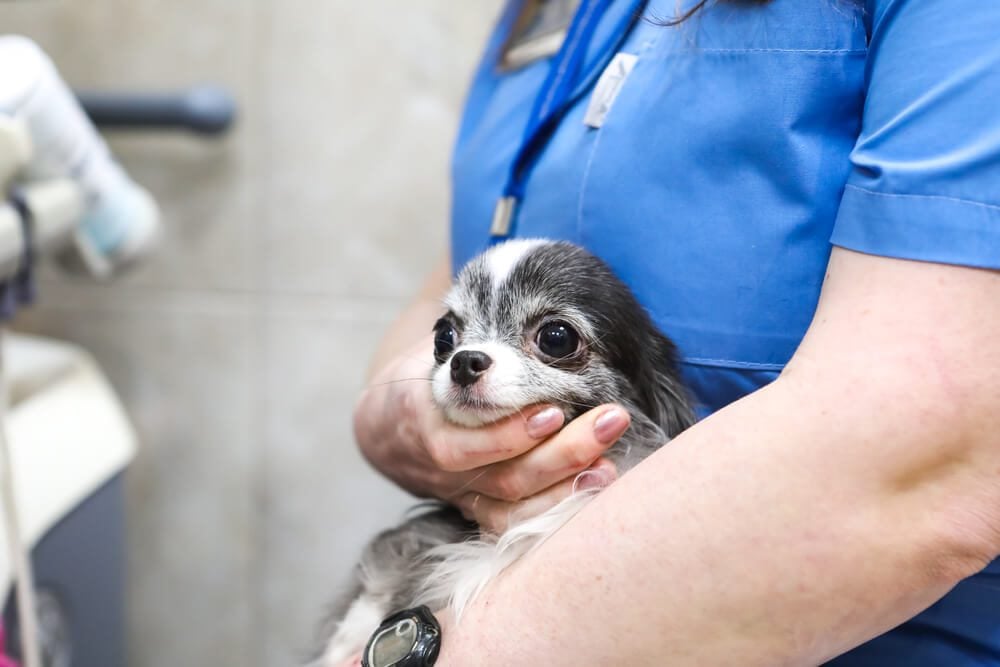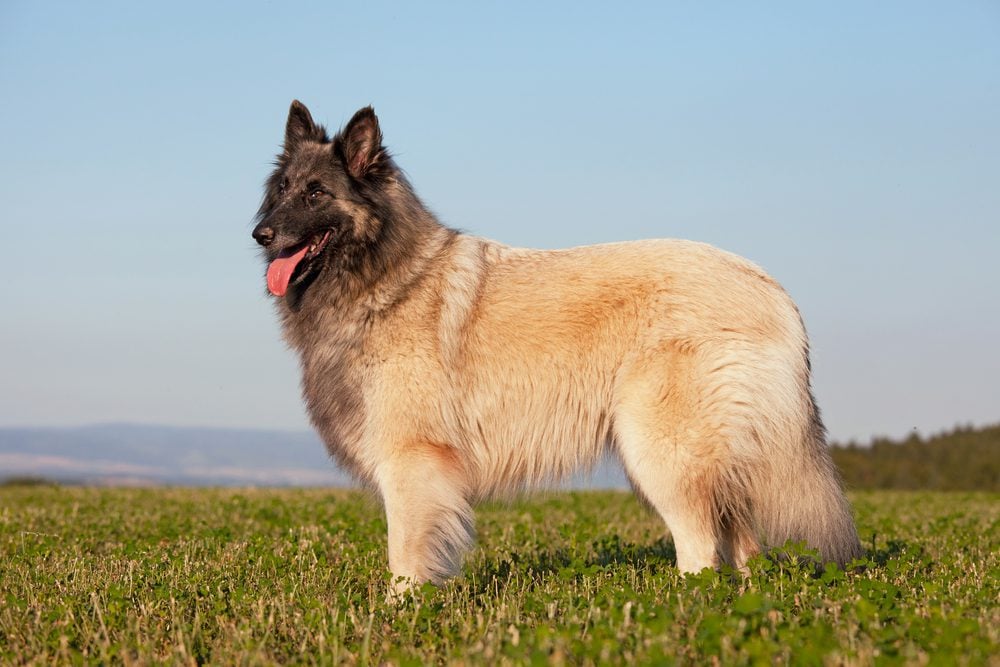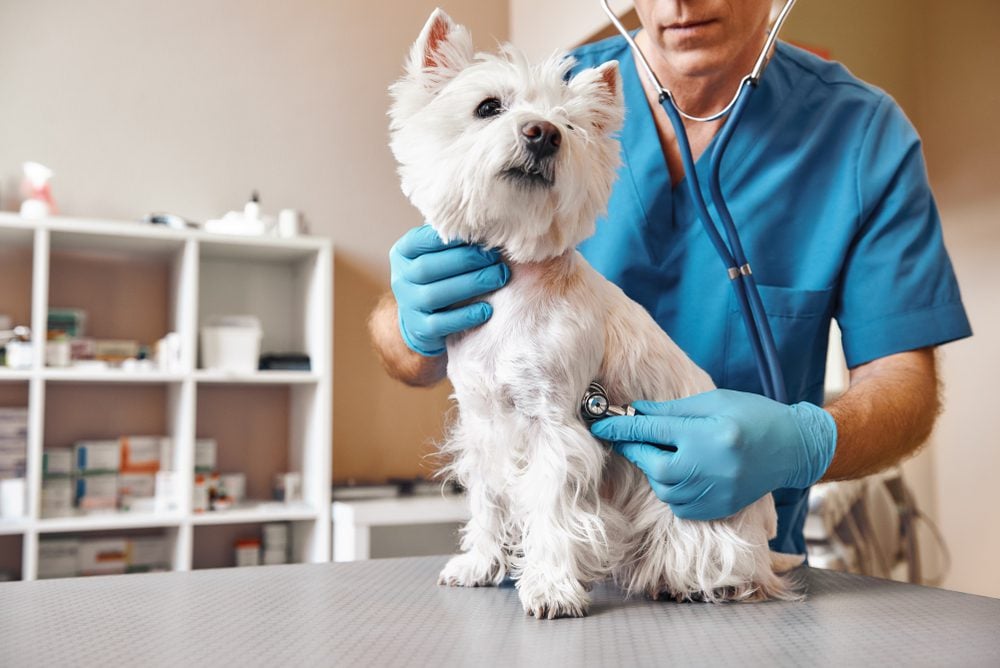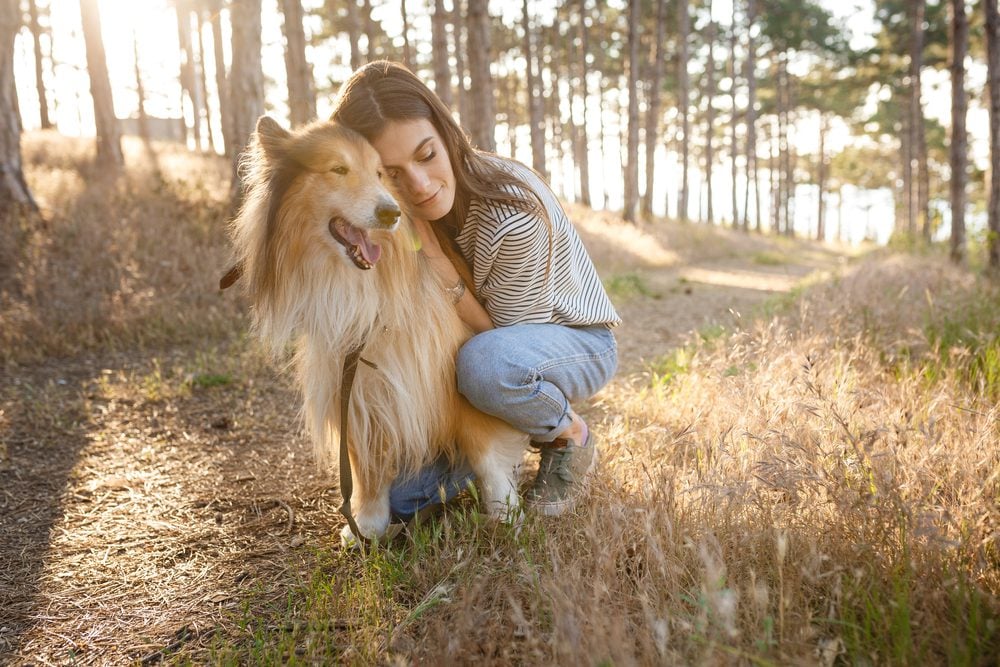A Pet Owners Guide to Stomach Cancer in Dogs: Causes, Symptoms, and Treatment

Table of Contents
What is Stomach Cancer in Dogs?

Stomach (gastric) cancer in dogs is a tumor that develops as a result of the uncontrolled growth of cells in the stomach. When the normal cells in the stomach lining or muscle layer turn into cancerous ones, the result is stomach tumor formation.
The cancer cell growth in the stomach is also known as gastric carcinoma, gastric tumors, or canine gastric cancer. As with all tumors, stomach cancer in dogs can be benign(non-cancerous) or malignant(cancerous). Malignant stomach cancer in dogs is more common and can spread to other parts of the body and sections of the gastrointestinal tract.
Signs and symptoms of stomach cancer in dogs usually become apparent in the advanced stages. For this reason, this form of dog cancer has a very poor prognosis and is known as a silent killer.
Compared to other cancers in the canine companion (bladder cancer, mammary carcinoma, bone cancer, squamous cell carcinomas, brain tumors), stomach cancer is not a common type of cancer. It accounts for less than 1% of total canine cancer cases. Stomach cancer in dogs can take different forms such as gastric adenocarcinoma, leiomyosarcoma, lymphoma, gastrointestinal stromal tumors, mast cell tumors, extramedullary plasmacytoma, adenomatous polyps, etc.
Types of Stomach Tumors in Dogs
According to Blue Pearl Vet, the most common gastric tumor in dogs is adenocarcinoma. Although stomach cancer in dogs is not the most common type of canine cancer, it deserves attention. Below you will find a summary of different types of stomach tumors seen in dogs.
Malignant Stomach Tumors. The majority of stomach tumors in dogs are cancerous or malignant. This means they are invasive and have high metastasis rates. Therefore, in cases of gastric carcinoma, the prognosis is poor. Adenocarcinomas start in the glandular cells while leiomyosarcoma in the muscle layers of the stomach.
Benign Stomach Tumors. Benign gastric tumors are very rare in dogs. On their own, they are benign lesions but can still interfere with normal digestive function. As they grow in size, they can cause secondary signs and symptoms like vomiting and stomach ulcers. In rare cases, benign tumors can grow large enough to obstruct the stomach.
How Fast does Stomach Cancer Spread in Dogs?
Malignant stomach cancer in dogs is very aggressive and spreads at a very fast rate. In fact, due to late diagnosis, stomach cancer is often discovered after it has already spread to other organs.
The organs most affected by stomach cancer are regional lymph nodes, but they can also spread to the liver, lungs, small intestines, pancreas, and esophagus. The presence of a visible spread of the cancer is a poor prognostic sign.
What Causes Stomach Cancer in Dogs?

The exact cause of stomach cancer in dogs is hard to determine. In most cases, cancer is triggered by a complex mix of risk factors. The following list explains the factors that affect the incidence of gastric carcinoma in dogs:
- Age. Older dogs are more prone to stomach cancer than younger dogs. Studies suggest there is a higher incidence of stomach cancer in dogs ten years or older. Although more common in elderly dogs, stomach cancer can occur in all dogs.
- Sex. Male dogs are at a higher risk of getting stomach cancer than female dogs. The exact reason gender plays an important role is not determined.
- Breed. Certain breeds of dogs have a high risk of stomach cancer, including Chow chows, Rough Collies, Staffordshire Bull Terriers, German Shepherds, Belgian Shepherds, Belgian Tervuren, Bouvier des Flandres, Chow Chow, Beagles, and others.
- Genetics. Most cancers have a genetic component which explains why certain breeds have a genetic predisposition to specific forms of cancer. Dogs whose parents had stomach cancer are more likely to get it as well. Cancer is the leading cause of death in certain dog breeds.
- Lifestyle. A dog’s quality of life largely influences its risk of acquiring chronic diseases, one of which is cancer. Diet, activity, and body weight are three of the factors that have been proven to affect disease risk. A diet high in nitrosamines has been linked to an increased risk of stomach cancer in humans and animals.
What are the Symptoms of Stomach Cancer in Dogs?
The clinical signs of stomach tumors are limited to the digestive tract. Here are the warning signs of stomach cancer in dogs:
- Vomiting. This is a common clinical sign of stomach cancer, especially in dogs on treatment. It usually occurs immediately after a meal, and if a dog has ulcers, the vomit may contain blood spots.
- Loss of Appetite. The pain in the stomach and the intestines may lead to inappetence.
- Bloody Stool. If the ulcers in the stomach start to bleed, the blood will become visible in a dog’s stool. In some cases, the stool might become loose or develop into diarrhea. Abnormal odors from the dog’s anal region may also be evident.
- Weight Loss. As a result of vomiting, loss of appetite, and sometimes diarrhea, a dog with stomach cancer will experience weight loss.
- Anemia. Blood loss in the stomach is one of the main causes of anemia. While it might not seem like a large amount, the amounts of blood lost in the gut are significant and can cause anemia.
- Nausea. This is a common symptom of stomach cancer, usually evidenced by excessive drooling. Dogs with stomach cancer tend to drool a lot, a classic sign of nausea.
- Change in Behavior. A dog’s behavior will change due to the chronic discomfort of living with cancer. Changes will include excessive whining, urinating or defecating accidents, and excessive licking.
- Abdominal Pain. The overall changes in digestive function may lead to cramping and abdominal pain.
- Changes in Bowel Movements. The disruption of proper food digestion can result in diarrhea, while the physical presence of a mass may cause GI tract blockage and constipation.
- Increased Risk of Infections. Since part of the immune system is located in the dog’s gut, stomach cancer in dogs may result in compromised immunity and a high risk of infections.
As you can see, cancer does not always manifest with a large mass or lump. Also, in the case of stomach tumors, the signs of cancer are not specific. It is advisable to seek help from a veterinary doctor as soon as you notice something unusual with your dog.
Diagnosing Stomach Cancer in Dogs

The diagnosis of any form of dog cancer starts with taking the dog’s medical history and performing a thorough physical examination. Swelling of the abdomen and unexplained weight loss are two things the vet can spot during the exam that may indicate cancer.
However, for a more accurate diagnosis, the veterinarian will order additional tests such as blood tests (complete blood count (CBC), liver enzymes), diagnostic imaging (abdominal ultrasound and x-ray images), and biopsy.
An endoscopic biopsy is the gold standard for stomach cancer diagnosis and involves surgical excision of a tumor to obtain tissue samples. The tissue samples are then examined under a microscope to determine if they are cancerous.
The goals of these tests are to determine the presence of this rare cancer, its type, and whether it has spread to other areas of the body. If the disease is progressed, the vet may refer the patient to a veterinary oncologist.
How do You Treat Stomach Cancer in Dogs?
The most common treatments for stomach cancer in dogs are surgery, chemotherapy, and radiotherapy. In addition to these mainstream approaches, modern cancer in dogs treatment often involves holistic approaches.
Below you will find a summary of the treatment process and options.
Surgical Resection of the Tumor. For tumors that have not yet spread to other organs, surgery may be present as the best option. In dogs where the tumor blocks the stomach, bypass surgery may be performed. Bypass surgery involves curative resection of the stomach. The surgical intervention requires anesthesia which may be risky for elderly dogs.
Chemotherapy and Radiation Therapy. Chemotherapy involves the use of specific drugs to kill off cancer cells. It is the best option for malignant tumors that have spread to other areas of the body. Radiation is not a common treatment option for stomach cancer due to the high risk of damaging nearby vital organs like the liver and pancreas.
In most stomach cancer cases, a combination of two treatments will be used. As a pet owner, you can play a major role in ensuring your dog lives a comfortable life during treatment. This is where holistic approaches kick in.
Cannabidiol (CBD) Products. Several scientific studies have shown that CBD has a positive effect on inflammation levels and anxiety. Both of these properties are extremely beneficial to dogs living with stomach cancer. We suggest the Honest Paws CBD Relief Collection. The Honest Paws CBD products are made with premium-quality and human-grade hemp oil.
What can I do to Prevent Stomach Cancer in Dogs?
Wondering how to prevent cancer in dogs? Sadly, there is very little you can do to prevent stomach cancer in your pup. This is because most of the factors that affect stomach cancer risks like age and sex are out of your control. What you can control, however, is your dog’s quality of life.
Provide your dog with a healthy lifestyle by giving her high-quality food and allowing her adequate physical activity every day. Opt for whole natural foods and limit processed foods, particularly cured meats. Healthy foods boost the dog’s immune system, prevent inflammation, and support overall wellbeing.
Another factor you can control is the quality of treatment your dog gets if she gets diagnosed with stomach cancer. The best treatments are very expensive, with surgery costing up to $8000. To ensure your pet is always provided with the best treatment, sign up for a good pet health insurance plan.
The OneVet Insurance Plan is the best deal you can get for your pet. For only $19.99, you get $3000 in emergency veterinary care coverage, 24-hour access to a licensed veterinarian, and coverage for any pre-existing conditions.
How Long Can Dogs Live With Stomach Cancer?

Most dogs with stomach cancer succumb to the disease within six months of diagnosis. The disease has very low survival rates because it is often caught in its late stages. If the dog’s quality of life is compromised, consult with your vet or support staff about euthanasia.
The key to a good prognosis for all types of cancer is early detection. For stomach cancer in dogs diagnosed in the early stages, the survival times and life expectancy increase accordingly.

















